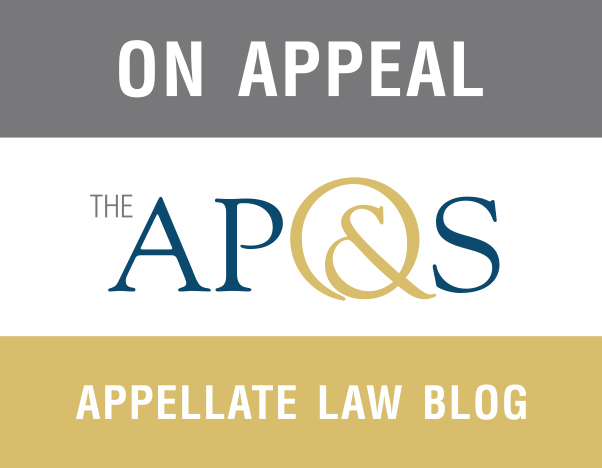A. Amicus Curiae
Bucci v. Hurd Buick Pontiac GMC Truck, LLC, 85 A.3d 1160 (R.I. 2014): In Bucci, the Supreme Court refused to consider an argument made only by amicus curiae. In doing so, the Supreme Court made clear that it “will not consider arguments that have made by an amicus curiae but that were not advanced by a party.” (citing Lane v. First Nat’l Bank of Boston, 871 F.2d 166, 175 (1st Cir. 1989) (“We know of no authority which allows an amicus to interject into a case issues which the litigants, whatever their reasons, might be, have chosen to ignore.”).
B. Bonds
Rose v. Cariello, 85 A.3d 618 (R.I. 2014): In Rose, after the Superior Court granted the plaintiff’s motion for additur or, alternatively, a new trial on damages in a personal injury case, the defendant filed a motion in the Supreme Court to stay the judgment. The Supreme Court granted the stay but conditioned it upon the filing of a supersedeas bond in the Superior Court.
Banville v. Brennan, 84 A.3d 421 (R.I. 2014): In Banville, the Rhode Island Supreme Court granted the defendants’ motion to stay an injunction requiring them to remove a building from the plaintiff’s land during the pendency of the defendant’s appeal on the condition that the defendants post a $50,000 bond.
C. Certiorari
1. Grant of Certiorari
Woodruff v. Gitlow, 91 A.3d 805 (R.I. 2014).
In a rare case, the Rhode Island Supreme Court granted a petition for writ of certiorari to review the trial justice’s denial of a defendant’s motion for summary judgment. The Court did not provide any rationale for its decision to grant the defendant’s petition for writ of certiorari, however, the case presented two discrete issues of first impression, which likely factored into the Court’s decision to grant the petition for writ of certiorari.
D. Cross-Appeals
Miller v. Metropolitan Property and Casualty Ins. Co., 88 A.3d 1157 (R.I. 2014): A party that has prevailed in the trial court must file a cross-appeal if he or she intends to ask the Supreme Court to overturn one of the trial court’s rulings. (citing David A. Wollin, Rhode Island Appellate Procedure § 4:5, 4-11 (West 2004)). However, “‘[a] cross appeal is not necessary when the [party that has prevailed in the trial court] simply wants to defend the judgment obtained below, even if it was on grounds different from those on which the judgment was based.’” (quoting Wollin § 4:5, 4-11).
E. Motion to Dismiss Untimely Appeal
Miller v. Metropolitan Property and Casualty Ins. Co., 88 A.3d 1157 (R.I. 2014): When a party maintains that a notice of appeal is untimely and the Supreme Court has not yet docketed the appeal, the trial court has jurisdiction to dismiss the appeal for failure to comply with the Supreme Court’s Rules of Appellate Procedure. See R.I. Sup. Ct. R. App. P. 11. In Miller, Metropolitan filed its motion to dismiss Miller’s cross-appeal as untimely with the Superior Court. When the Superior Court denied Metropolitan’s motion to dismiss, Metropolitan filed an appeal to the Supreme Court from that order.
F. Notice of Appeal
Miller v. Metropolitan Property and Casualty Ins. Co., 88 A.3d 1157 (R.I. 2014): As a general matter, a notice of appeal must be filed within 20 days of “the date of the entry of the judgment, order, or decree appealed from.” R.I. Sup. Ct. R. App. P. 4(a). The notice must be filed with the trial court’s clerk’s office, not the Supreme Court’s clerk’s office. Id. The form for filing a notice of appeal may be found in the trial court’s clerk’s office. If there is information that does not fit within the allocated space on the form, it is common practice to attach an addendum to the notice form. In Miller, the appellant attached an exhibit to its notice of appeal identifying additional parties.
National Refrigeration, Inc. v. Capital Properties, Inc., 88 A.3d 1150 (R.I. 2014): In National Refrigeration, after judgment had entered and after the plaintiff had filed its notice of appeal, the plaintiff filed a motion to increase the amount of a bond. On appeal, the plaintiff argued that the Superior Court erred in denying its motion to increase the bond. On appeal, the Supreme Court concluded that the issue of the amount of the bond was not properly before it. In so holding, the Supreme Court noted that while “a notice of appeal that designates the final judgment encompasses not only the judgment, but also all earlier interlocutory orders that merge in the judgment,” there is no basis for the Court to review an order entered subsequent to the judgment on appeal.
G. Sanctions
Fiorenzano v. Lima, 84 A.3d 811 (R.I. 2014): Although it is well settled that an appeal may be dismissed when it has not been perfected, the Rhode Island Supreme Court has made clear that sanctions should not be imposed for mere failure to perfect an appeal.
In Fiorenzano, when the plaintiff failed to perfect his appeal, the trial justice granted the defendant’s motion to dismiss plaintiff’s appeal and, in addition, ordered that plaintiff pay defendant $1,500 as compensation for defendant’s attorney obtaining dismissal of the appeal.
On appeal, the Supreme Court held that the imposition of a sanction for the plaintiff’s failure to perfect his appeal was in error. According to the Court, “[n]o statute or rule calls for any further sanctions for the failure to perfect an appeal.”
H. Transcripts
Process Engineers & Constructors, Inc. v. DiGregorio, Inc., 93 A.3d 1047 (R.I. 2014): In Process Engineers, the Rhode Island Supreme Court again reminded litigants that it is the responsibility of the parties to ensure that all proper transcripts are ultimately filed with the Court. To that end, “Article I, Rule 10(b)(1) of the Supreme Court Rules of Appellate Procedure leaves it to the appellant to ‘order from the reporter a transcript of such parts of the proceedings not already on file as the appellant deems necessary for inclusion in the record.’” Thereafter, “[t]he appellee may . . . request additional transcripts if he or she thinks they are necessary.”
I. Show Cause Calendar
Ho-Rath v. Rhode Island Hospital, 89 A.3d 806 (R.I. 2014): Cases that come before the Rhode Island Supreme Court typically are assigned to either the Court’s full argument or show cause calendar. In full cases, each side is permitted 30 minutes for oral argument and the appellant may reserve 10 minutes for rebuttal. Unless otherwise specified by the Court, parties in full cases may submit briefs 50 pages in length and reply briefs 25 pages in length. See R.I. R. App. P. 16(f). In show cause cases, each side is permitted 10 minutes for oral argument and the appellant may reserve two minutes for rebuttal. Unless otherwise specified by the Court, parties in show cause cases by submitting supplemental papers no longer than 10 pages in length. See R.I. R. App. P. 12A(4).
Most often, when cases are assigned to the show cause calendar, the Supreme Court concludes that cause has not been shown and decides the case on the basis of the papers and arguments before it. Occasionally, however, the Court will conclude that cause has been show and will order that the case be assigned to the Court’s full argument calendar and that the parties be permitted full briefing and argument.
That was the case this term in Ho-Rath, a decision in which the Supreme Court concluded that two issues of first impression warranted full briefing and argument. Accordingly, the Court assigned the following two questions to the Court’s full argument calendar: (1) whether, in accordance with R.I. Gen. Laws § 9-1-14.1(1), medical malpractice claims may be brought on a child’s behalf at any time before the minor reaches the age of majority, and thereafter by the child within three years after attaining the age of majority and (2) whether parents may bring their derivative claims at whatever time the minor’s medical negligence claims are pursued. It is anticipated that these important and novel issues will be the subject of a decision next term.




